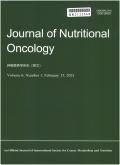Potential preventive effects of time-restricted eating on cancer
引用次数: 0
Abstract
Abstract Intermittent fasting is a novel dietary intervention that has been demonstrated to improve the efficacy of cancer therapy and reduce complications. Time-restricted eating is a specific form of intermittent fasting. It usually restricts only the daily eating window and not the amount of calories consumed. In addition to providing a means for weight management and improving metabolism like other intermittent fasting methods, time-restricted eating also synchronizes circadian rhythms and affects autophagy levels, which has potential antiaging effects. Some studies have shown that time-restricted eating can prevent tumorigenesis and slow tumor progression. Moreover, because of its simplicity and mild adverse effects, time-restricted eating is safe and has a high rate of compliance. It may be used an adjuvant therapy and may be part of a healthy lifestyle suitable for long term by cancer patients or those at high risk of developing specific cancers. This article expounds on the potential impact of time-restricted eating on the prevention and treatment of cancer, as well as the potential mechanism(s) of action. There are 3 main aspects considered to be impacted by time-restricted eating: improving obesity and metabolic disorders, synchronizing the circadian rhythm, and upregulating autophagy. We herein present the current research progress related to the effects of time-restricted eating on malignant tumors. The purpose of this review is to provide a theoretical basis and direction for future research to explore the potential of time-restricted eating as a nutritional intervention to prevent the occurrence of cancer and as a treatment or adjuvant therapy for cancer. We believe that this approach may be conducive to improving the nutritional status of cancer patients and improving their prognosis and quality of life.限时饮食对癌症的潜在预防作用
间歇性禁食是一种新型的饮食干预,已被证明可以提高癌症治疗的疗效并减少并发症。限时饮食是间歇性禁食的一种特殊形式。它通常只限制每天的进食时间,而不限制卡路里的摄入量。限时饮食除了像其他间歇性禁食方法一样提供了一种控制体重和改善新陈代谢的方法外,还能同步昼夜节律,影响自噬水平,从而具有潜在的抗衰老作用。一些研究表明,限时饮食可以防止肿瘤发生,减缓肿瘤进展。此外,限时进食法简单,副作用轻微,安全,依从性高。它可以作为一种辅助疗法,也可以成为癌症患者或患特定癌症的高风险人群长期健康生活方式的一部分。本文阐述了限时饮食对预防和治疗癌症的潜在影响,以及可能的作用机制。限时饮食被认为有三个主要方面的影响:改善肥胖和代谢紊乱,同步昼夜节律,上调自噬。现就限时进食对恶性肿瘤影响的研究进展作一综述。本文综述的目的是为今后的研究提供理论依据和方向,探讨限时饮食作为预防癌症发生的营养干预手段以及作为癌症的治疗或辅助治疗手段的潜力。我们相信这种方法可能有利于改善癌症患者的营养状况,改善其预后和生活质量。
本文章由计算机程序翻译,如有差异,请以英文原文为准。
求助全文
约1分钟内获得全文
求助全文

 求助内容:
求助内容: 应助结果提醒方式:
应助结果提醒方式:


